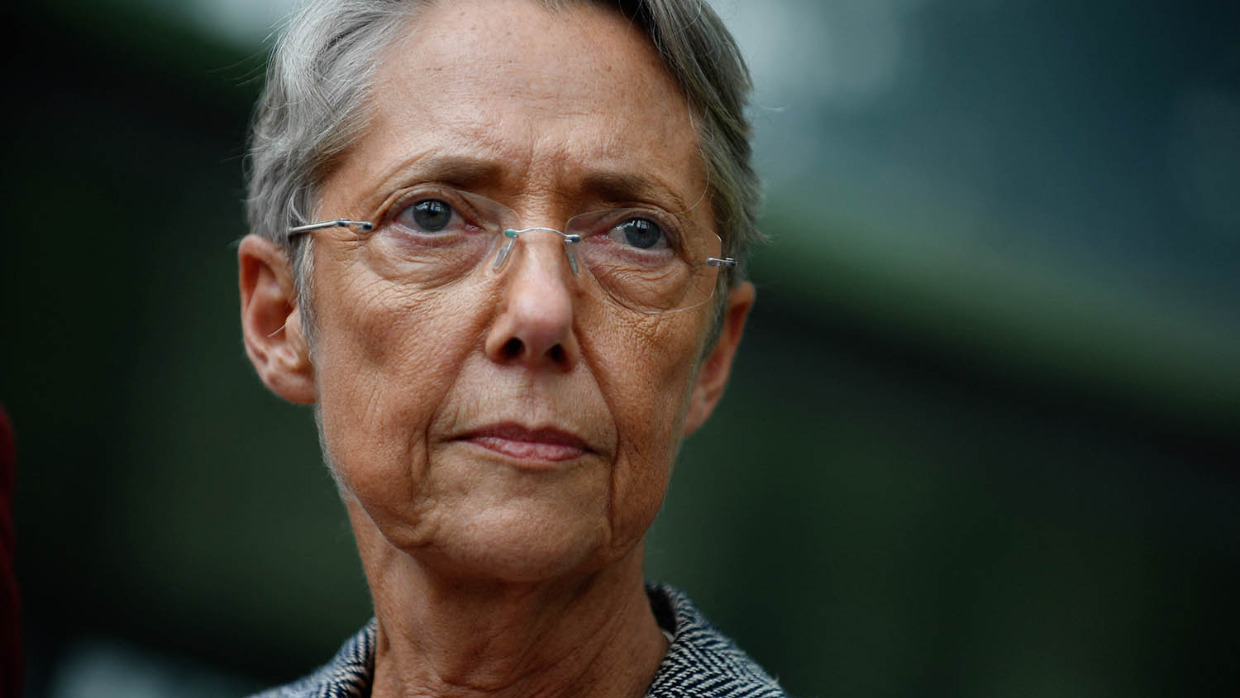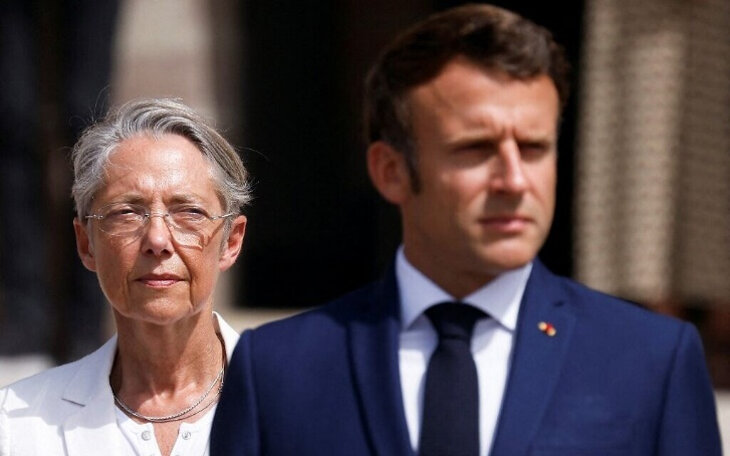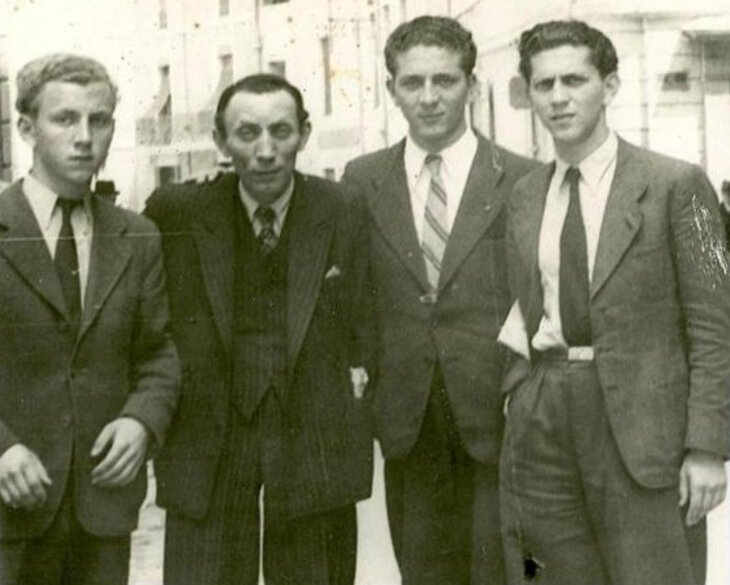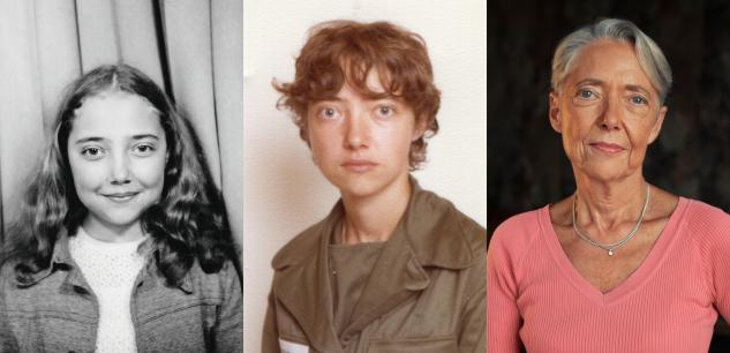 Vampire Weekend's Surprising Jewish Stories
Vampire Weekend's Surprising Jewish Stories


8 min read
Prime Minister Elisabeth Borne’s father, Joseph Bornstein, survived Auschwitz.
When France’s President Emanuel Macron appointed Elisabeth Borne Prime Minister in 2021, much of the media coverage focused on her gender: she is only the second female Prime Minister in French history. She was hailed as a competent, technocratic leader who could help defend Macron’s controversial pensions reforms.
Few of her colleagues - not even many of her close friends - realized that Prime Minister Borne’s political success hid a harrowing personal history: that her father was a Holocaust survivor whose despair led him to take his own life, and that Ms. Borne was raised by a traumatized single mother with help from the state. In recent days, however, Ms. Borne has been speaking out about her family’s tortured past.
“It’s a personal story that’s quite painful,” she’s explained after journalists uncovered family details that had long remained hidden and which even Ms. Borne did not know.
 Elisabeth Borne with President Macron
Elisabeth Borne with President Macron
At a recent meeting of the French Jewish communal group CRIF (Conseil Representatif des Institutions juives de France), the Prime Minister described how her father, Joseph Bornstein, was arrested and sent to Auschwitz in 1943. “That day, together with my grandfather and my uncles, he was arrested by the Gestapo…. Then came the sealed wagons, the orders, the beatings, the humiliations….”
The Bornstein family was originally from Poland, and moved to Belgium, part of an exodus of eastern European Jews in the years after World War I who moved to France, Belgium, Britain, and North and South America. The Bornsteins moved once again in 1940, fleeing Nazi-occupied Belgium and settling in the southern French city of Nimes. They found a temporary safe haven there but it didn’t last for long.
In 1940, Marshal Philippe Petain created the pro-Nazi “French State,” more commonly known as the Vichy collaborationist regime. Its territory included Nimes. Ever more restrictive laws targeted Jews, but for a time, ironically, Jews in Vichy France were more secure than their co-religionists in the north, where Nazis - assisted by French officials - began rounding up and deporting Jews. The relative safety of Jews in southern France evaporated in 1942, when Vichy France came under direct Nazi control. Suddenly, Jews across France were being arrested and deported, sent to Nazi concentration camps and death camps, never to return.
 Joseph Borne (left) with his father and two elder brothers before their deportation to Auschwitz. © Les Amis de la Fondation pour la Mémoire de la Déportation
Joseph Borne (left) with his father and two elder brothers before their deportation to Auschwitz. © Les Amis de la Fondation pour la Mémoire de la Déportation
Joseph Bornstein decided to take the highly dangerous step of joining the French Resistance. Like many Jews, he joined a Jewish resistance cell, moving to the French city of Grenoble to fight the Nazi occupiers and their French collaborators.
The fact that many Jewish resistance groups operated throughout France deserves to be more widely known.
One of the first, the “Jewish Army,” was founded in the south of France in 1940, by a Jewish refugee from eastern Europe named David Knout. Realizing that Jews faced deadly mortal peril, he arranged a secret fighting force, and also began calling for the establishment of a Jewish state in the Land of Israel. At the beginning of 1942, Knout and his fellow fighter Lucien Lublin (also a Jewish refugee from eastern Europe) published a manifesto for Jewish resistance cells throughout the country. It reads, in part:
The Jewish people are facing a danger unlike anything it has faced in its long history…. Antisemitism has become stronger and more efficient over the past fifty years, to the point that in our day it has become a movement that is international, scientifically organized, and armed beyond all others. It’s plan, to annihilate the Jewish people, is already in the stages of implementation…
The “Jewish Army” called on Jews to resist, and untold numbers heeded the call to action. Partisans helped smuggle Jewish refugees over the Pyrenees to Spain, helped hide Jews in the French countryside, and engaged in acts of armed rebellion and sabotage. It’s unclear how long Joseph Borenstein managed to hide from Nazi forces. Eventually, he, along with his father and brothers were arrested.
They were sent to Drancy, a hastily-made concentration camp in the northeastern Parisian suburb of Drancy. Once a barracks for France’s Gendarmerie police force, the camp consisted of a long, four story building that was built to house 700 people. In time, many thousands of Jews - men, women, and children - were crammed into the overcrowded structure.
Until 1943, Drancy was run not by German occupying forces, but by French policemen. They oversaw a starvation regimen of the many thousands of Jews under their control: food rations were a meager 600-800 calories per day. Despite the horrors of the camp, Jewish prisoners managed to create a vibrant cultural and religious life. Yad Vashem describes the Jews’ commitment to their faith:
They arranged concerts and literary evenings, and the prisoners read books that had been smuggled into the camp. A school was established, and even after its official closure in January 1943, it continued to operate clandestinely. Hundreds of Jews participated in Sabbath prayers and religious ceremonies, and marked Rosh Hashanah…and Yom Kippur…in the synagogue that had been set up in September 1941. In June 1942, the Germans issued an order forbidding Jewish ceremonies, but the High Holidays were still observed in the fall of 1943…
From June 1942 to July 1944, when Drancy was liberated by Allied forces, over 70,000 Jews passed through the camp. The vast majority - over 65,000 - were sent from Drancy to Nazi death camps in eastern Europe, primarily Auschwitz. Deportations of Jews from Drancy to their deaths were a regular feature of daily life in the camp. One of the many transports brought Joseph Bornstein, his father Zelig, and two of his brothers to Auschwitz. Joseph’s younger brother and father were sent immediately to the gas chambers and murdered.
Joseph Bornstein and his older brother were kept alive in Auschwitz to work as slave laborers in a synthetic fuel factory. The sign over Auschwitz’s main gate famously reads Arbeit macht frei, which means “work makes one free” in German, but one of the objectives was to kill Jewish slaves through overwork. Conditions were horrendous, food was nearly nonexistent and slave laborers perished every day. Factories on the grounds were leased by mainstream companies such as BMW, Ford, and I.G. Farben profited from the free labor that Auschwitz’s slaves supplied before they perished.
After he was freed at the end of World War II, Joseph Bornstein returned to France. (He met his wife, Marguerite Lescene on the platform of the Orsay train station in Paris.) Once he was back in France, Joseph wrote two letters for French newspapers describing the horrors he witnessed in Auschwitz.
He described watching as a Nazi guard killed babies with an ax. He also described his experience on a death march towards the end of the war when Nazi guards shot Jewish prisoners who were unable to walk any more, then loaded their bodies onto wagons. Joseph was one of the Jews hoisted onto a wagon, he described: “I was lying on the bodies of three of my friends, who had just died.”
 Elisabeth Borne
Elisabeth Borne
Instead of believing his accounts, Joseph faced incredulity. Someone accused him of inventing his recollections. “So, he shut down completely,” his daughter, Prime Minister Borne, has described. “He didn’t talk about it anymore.”
Overcome by depression and despair, in 1972, Joseph Bornstein took his own life. His wife and daughter suffered immensely. Ms. Borne has spoken about how her mother was unable to find work for years, and how she herself retreated into her studies, particularly math, as a way to cope with her grief. She became a pupille de al Nation, a French term for teenagers who were orphaned in war and who are eligible for financial assistance from the state. That experience has guided her commitment to public service, Ms. Borne has explained.
On February 13, 2023, Prime Minister Borne appeared at CRIF’s annual dinner, where she uncharacteristically opened up about her father and her Jewish heritage. “Many books and films have shown this (the Holocaust), but I don’t think anyone can really imagine it… For all those who returned, a different life was beginning. Some have succeeded in keeping the taste of hope and faith in life. Others didn’t. I know it only too well….”
She reiterated Pres. Macron’s commitment to protecting France’s Jews and noted that in recent years, the number of antisemitic attacks reported in France have declined. “The results obtained are certainly not a sign that it is necessary to stop,” she cautioned. “They mean, on the contrary, that we are going in the right direction - and that we must continue.”
